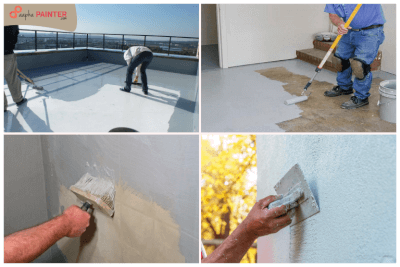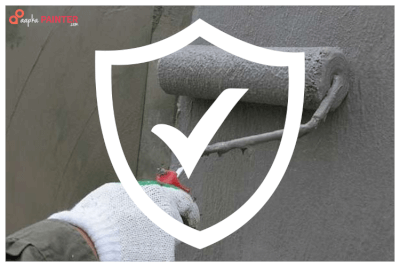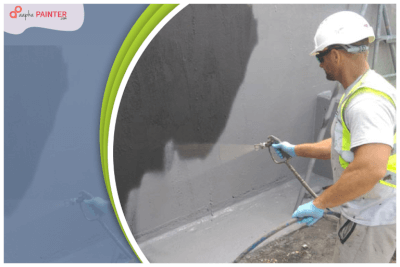Table of Contents
Cementitious Waterproofing Protects Your Home
Concrete structures are exposed to continuous erosion and wear and tear. Plus, we cannot avoid that most concrete surfaces, especially roads and floors, are subjected to continuous mechanical abrasions.
Due to all these cumulative reasons, the surfaces erode earlier, forming cracks and holes, and losing strength. It weakens the entire concrete structure and causes water seepage, further damaging the structures from within. For example, when water seeps through the cracks in your driveway, it weakens the internal concrete structure, making that driveway prone to accidents.
Sometimes, walls and floors absorb water through the cracks and holes and swell up, indicating the symptoms of dampening. It gives away a thriving place for molds and makes the ambiance unhealthy for living. This is where the concept of cementitious waterproofing comes into play.
It is a process through which the concrete surfaces are made waterproof with the help of cement-based coating. In most areas where the concrete surfaces are exposed to natural and weather elements of corrosion and abrasion, waterproofing is done to prevent water absorption and weaken the masonry and concrete structures.
However, many people are still staggering in the dark to understand the benefits of cementitious waterproofing, especially in the concrete industry. Keeping this in mind, we have explained some of the advantages of this method of applying a cement-based coating on concrete surfaces once the structures are formed completely.

Top Advantages of Cementitious Waterproofing
- Seamless surface coating
Since the coating is made from cement, it forms a seamless cover over the concrete surfaces. There won’t be any ups and downs once the coating is applied. Construction workers can easily level up the surface using the flattening tool and remove the excess cement-based coating for more uniformity. This is why cementitious waterproofing is done in both residential and commercial areas.
- Resistant to weather and abrasion
The coating prepared from cement is often combined with other elements to prevent abrasion and corrosion due to mechanical wear and tear and the weather. For example, if the naked concrete surface is exposed to the sun for prolonged hours, it can easily develop cracks due to extreme heat.
Similarly, if you see the driveway made from concrete only, minute cracks will be developed due to the continuous movement of high-pressure traffic. Construction workers often pour a cement-based coating over the concrete to avoid such damage to the concrete surfaces. This coating prevents mechanical abrasion and h9des the concrete surface from weather elements, preventing the formation of cracks.
- Repels chemical elements
Another major benefit of cementitious waterproofing is its ability to resist chemical reactions with concrete surfaces. The concrete material is highly reactive to certain chemicals, especially acids. Therefore, if your area receives acid rain or the floor is often exposed to different types of chemicals, it won’t be long till the concrete surface shows signs of wear and tear.
As a result, the inner layers of the construction structures become vulnerable and get exposed to further damage. That’s why the coating is applied once concrete cures and hardens. It resists chemical reactions, especially oxidative reactions that strip off the upper layer of the concrete structures.
- Excellent surface bonding
Although other materials are used as a coating for concrete structures, they do not have a high bonding affinity with the concrete surfaces. As a result, they wear down faster, exposing the structure to mechanical abrasions, chemical reactions, and weather corrosion. This is where the concept of cement-based waterproofing comes into play.
The materials used in making the coating have a great affinity for the concrete surface. Therefore, it forms a strong bond and doesn’t allow the corrosive materials to react with the concrete structures.
- Compatible with low and high-pressure areas
Another reason to choose cementitious coating over other forms of surface coating in case the structure is made from concrete is the compatibility of the materials with low and high-pressure situations. When we talk about the kitchen or terrace floors, the traffic movement is less. Therefore, the surface pressure isn’t much.
But if we consider the roads or the driveways, the car wheels put a lot of pressure on the concrete surfaces, causing excessive damage. Not many coatings with waterproofing ability can withstand both types of pressure. This is why the cement-based coating is applied over the concrete surfaces. The materials withstand different pressure values, protecting floors at various locations, from your terrace to the driveway.
- Resist CO2 and chloride diffusion
Concrete surfaces can easily facilitate the diffusion of carbon dioxide and chloride ions. These cause concrete scalding and weaken the structure from within. The best way to prevent this damage is to pour a coating from cement and other materials over the concrete surface. It will prevent the diffusion of chloride ions and carbon dioxide molecules, preventing chemical leaching from within.
- Prevents surface swelling up
Sometimes, the damage cannot be seen from the top of the concrete surface. For example, when the concrete structure starts absorbing moisture unlimitedly, it swells up from within, weakening the overall structure. If you allow it to happen for a prolonged time, it is just a matter of time before the structure collapses or forms deep and wide cracks beyond repair.
This is why cementitious waterproof coating is preferred the most. It can prevent the concrete surfaces from absorbing moisture and swelling up from within. Therefore, the structure continues exhibiting exceptional strength, preventing further accidents.
- Extends the lifetime of concrete
Undoubtedly, the cementitious waterproofing coating keeps the concrete surfaces safe from mechanical abrasions, chemical reactions like oxidative damage, and carrion due to weather. As a result, the lifetime of concrete will be extended, and you won’t have to call for a professional repair or renovation company multiple times within a short span.
Conclusion
Since we have walked you through the major benefits of applying cementitious waterproof coats on concrete surfaces, you must discuss the same with your builder and get the job done soon. Based on the type of concrete used, the traffic movement, and the corrosive elements exposed to the surface, the contractor will decide what additives to mix with cement and water. All in all, it is one of the cost-effective waterproofing strategies for concrete construction.

